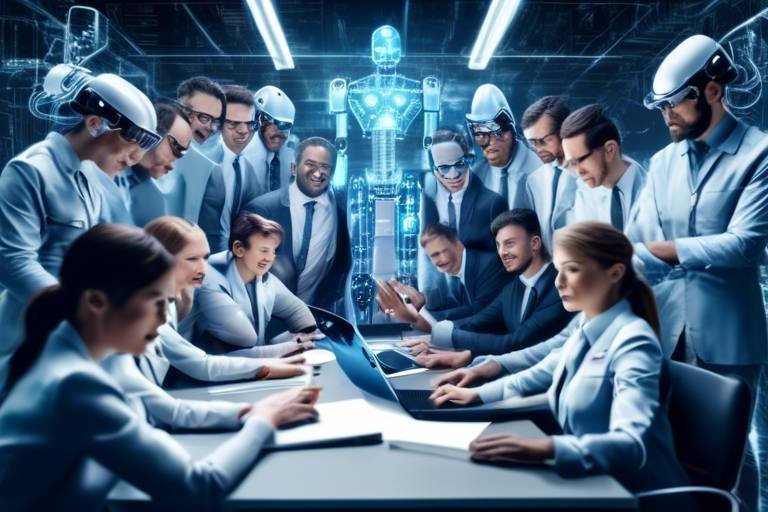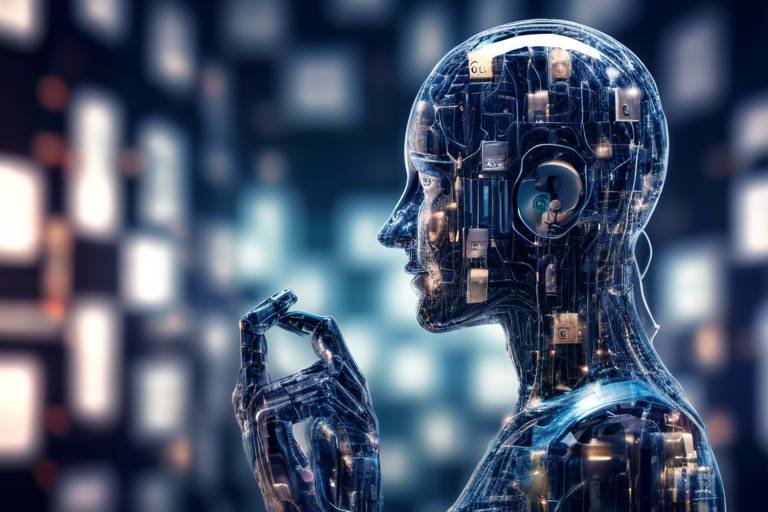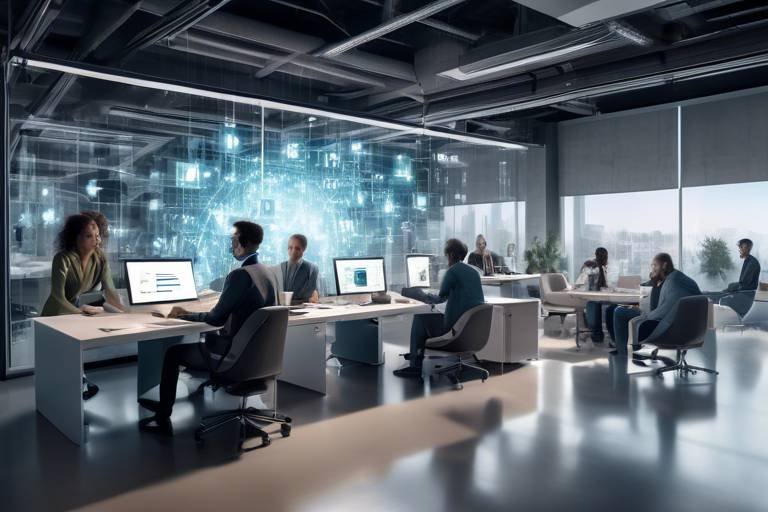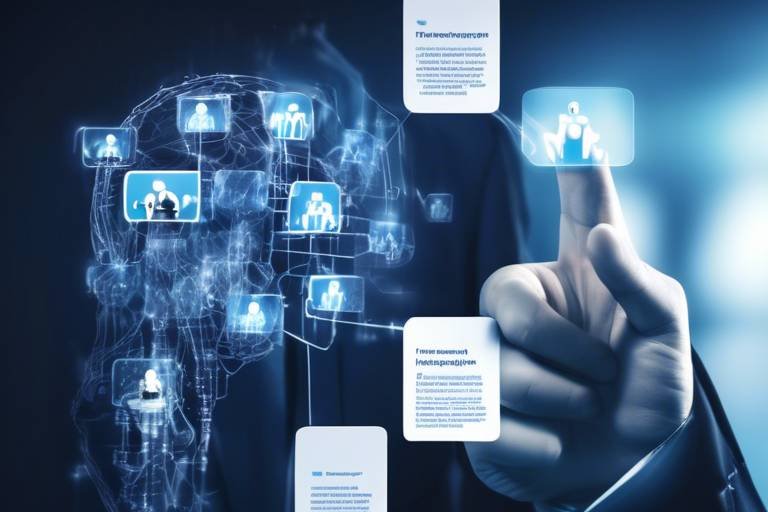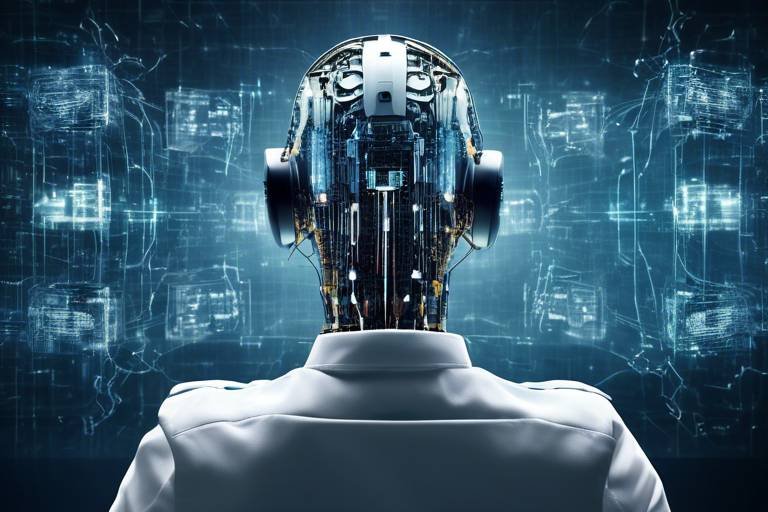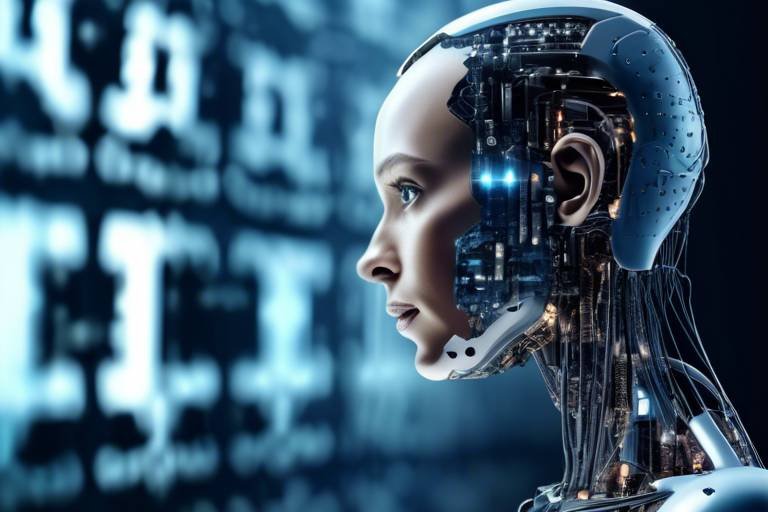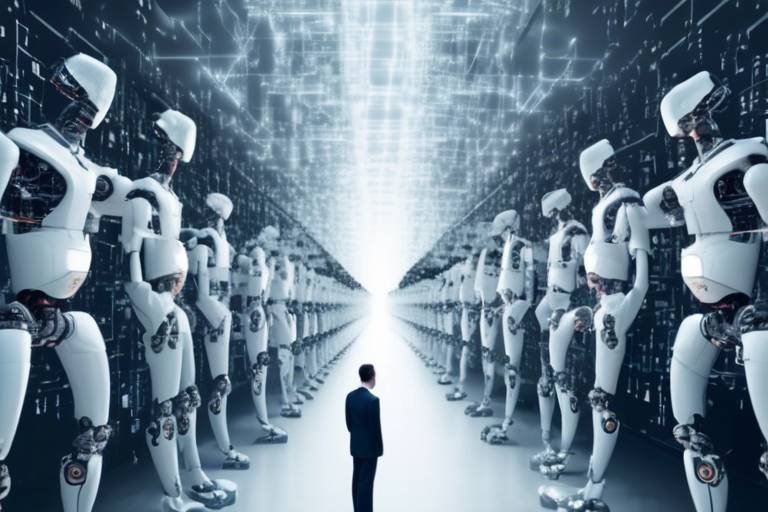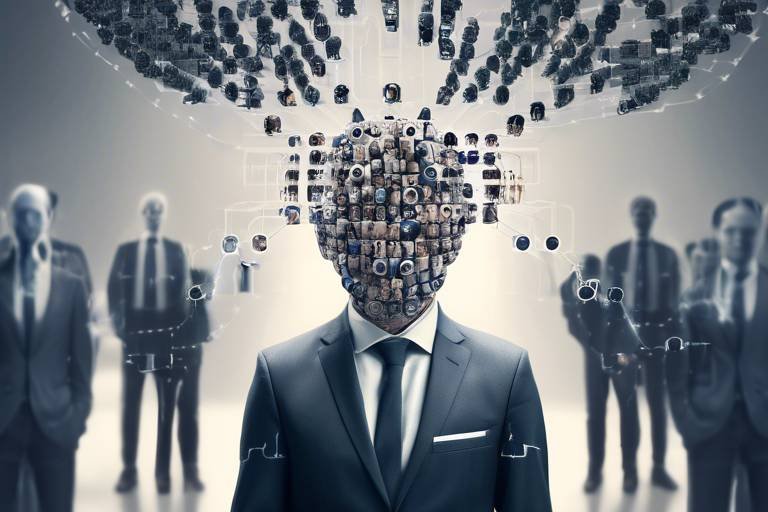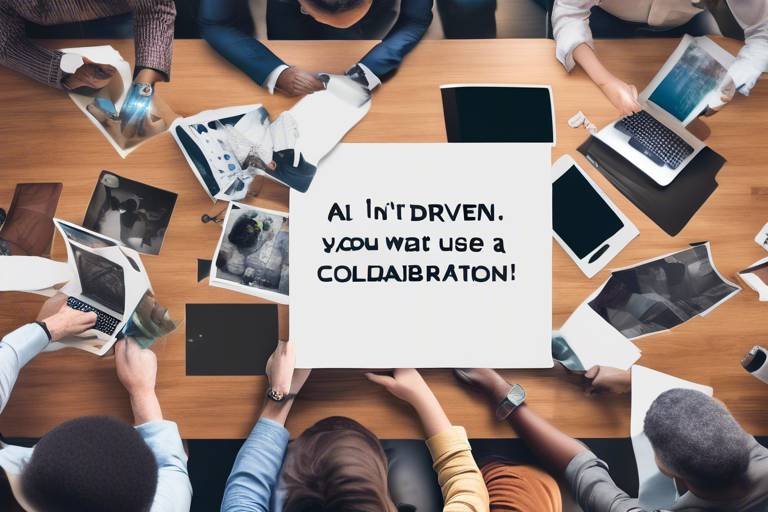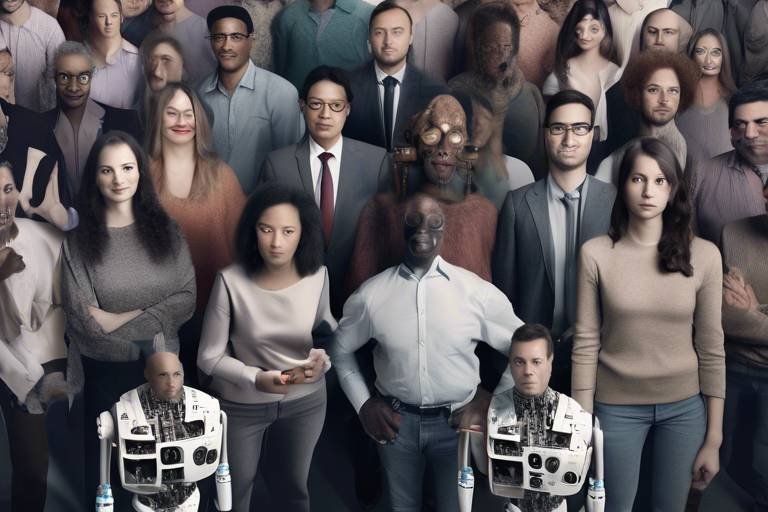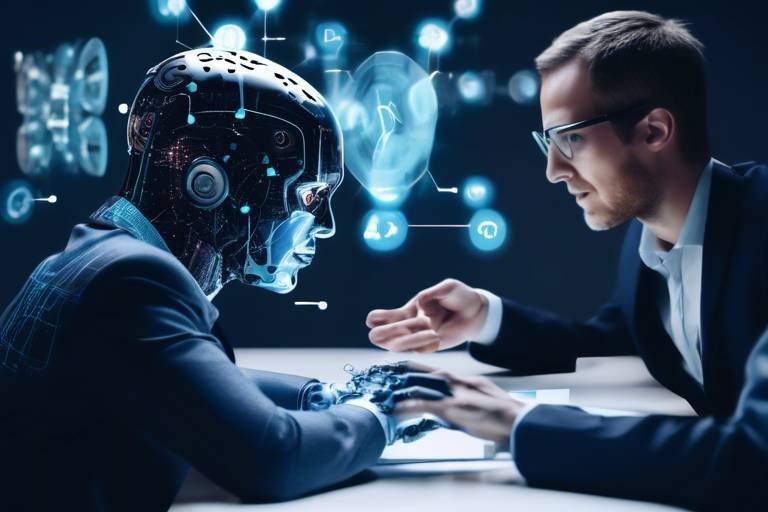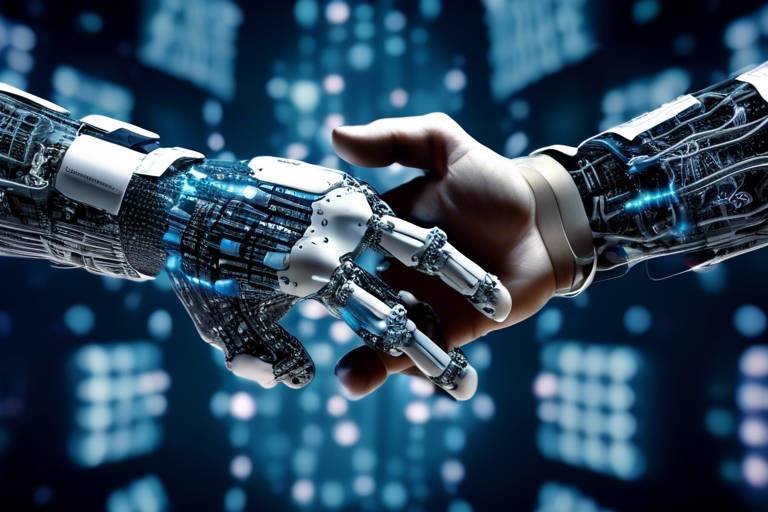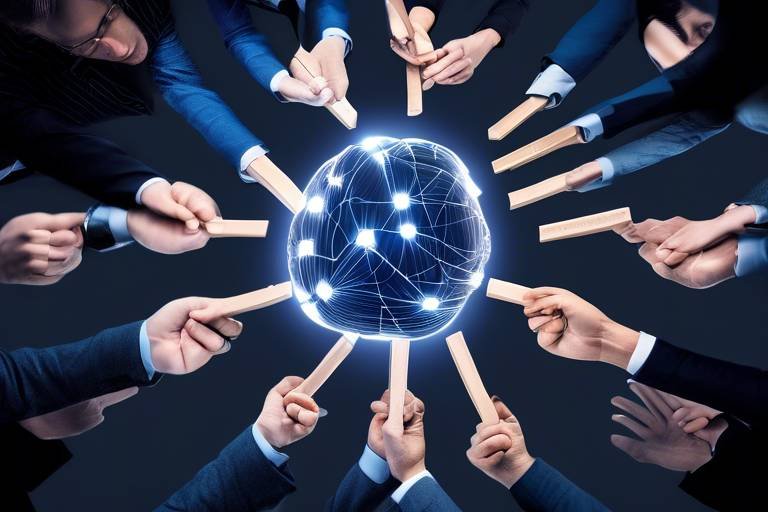Revolutionizing Teamwork Among Humans Through AI
In today's fast-paced world, the way we collaborate is undergoing a monumental transformation, thanks to the advent of artificial intelligence. Imagine a workplace where communication flows effortlessly, tasks are completed in a fraction of the time, and innovation thrives like never before. Sounds like a dream, right? Well, it's becoming a reality as AI reshapes the dynamics of teamwork. This article explores how AI is not just a tool but a game-changer in enhancing collaboration among teams, boosting productivity, and fostering a culture of innovation.
At its core, AI is about intelligence—the ability to analyze, learn, and adapt. When applied to teamwork, this intelligence translates into smarter communication, enhanced efficiency, and more informed decision-making. Whether you're a small startup or a large corporation, the integration of AI into your team dynamics can lead to groundbreaking results. So, how exactly is AI revolutionizing teamwork? Let's dive in!
Effective communication is the backbone of any successful team. However, traditional methods often fall short, leading to misunderstandings and delays. Enter AI-driven communication platforms that are breaking down barriers and facilitating seamless interactions. These tools leverage natural language processing and machine learning to enhance clarity and speed in communication.
Imagine a scenario where you can send a message, and an AI tool instantly summarizes the conversation, highlighting key points and action items. This not only saves time but also ensures that everyone is on the same page. Some of the most popular AI communication tools include:
- Slack: Integrates AI to provide smart replies and automate routine queries.
- Microsoft Teams: Uses AI for transcription services, making meetings more accessible.
- Trello: Incorporates AI to suggest task assignments based on team members' strengths.
With these tools, teams can communicate more effectively, leading to enhanced collaboration and a more engaged workforce. It's like having a personal assistant that keeps everyone aligned and informed!
Now, let’s talk about productivity. In a world where time is money, AI technologies are streamlining workflows and automating repetitive tasks, allowing teams to focus on what truly matters—high-value activities that drive results. Think of AI as your team's secret weapon, helping to eliminate mundane tasks and free up time for creativity and strategic thinking.
Automating routine tasks can significantly free up team members' time. For instance, imagine a project where team members spend hours on data entry or scheduling. With AI, these tasks can be automated, allowing individuals to concentrate on more critical aspects of their work. AI can assist in task delegation and management, improving overall efficiency.
Project management software enhanced with AI features can optimize resource allocation and project timelines. Tools like Asana and Monday.com are leading the charge by incorporating AI to predict project bottlenecks and suggest adjustments, ensuring that teams stay on track.
AI provides teams with real-time data analytics, enabling informed decision-making. Imagine having access to dashboards that not only display metrics but also analyze trends and provide actionable insights. This capability allows teams to pivot quickly, ensuring that projects are completed efficiently and effectively.
AI fosters collaboration by providing platforms that facilitate teamwork. Tools like Google Workspace and Notion allow team members to collaborate in real-time, share documents, and brainstorm ideas, all while AI enhances the experience with smart suggestions and editing capabilities. It's like having a virtual brainstorming session where everyone can contribute effortlessly!
In a collaborative environment, decision-making can often be a lengthy process. However, AI's ability to analyze vast amounts of data aids teams in making informed decisions quickly. By providing insights based on historical data and predictive analytics, AI empowers teams to strategize effectively.
Predictive analytics can forecast trends and outcomes, allowing teams to plan with confidence. This capability is invaluable for strategic planning, as it helps teams anticipate challenges and opportunities. It's like having a crystal ball that guides your team toward success!
Conflict is inevitable in any team, but AI can assist in identifying potential conflicts and suggesting resolutions. AI tools can analyze communication patterns and flag issues before they escalate, fostering a harmonious team environment. It's like having a mediator that helps maintain peace and productivity!
As AI continues to evolve, its role in team dynamics will expand. We can expect more sophisticated tools that not only enhance productivity but also promote creativity and innovation. The future holds exciting possibilities for teams willing to embrace AI as a partner in their collaborative efforts.
Q: How can AI improve team communication?
A: AI enhances communication by providing tools that facilitate clear, concise interactions, summarize discussions, and automate responses.
Q: What are some AI tools for project management?
A: Popular AI-enabled project management tools include Asana, Monday.com, and Trello, which help teams optimize workflows and manage tasks efficiently.
Q: Can AI really help with conflict resolution?
A: Yes! AI can analyze communication patterns to identify potential conflicts and suggest resolutions, helping maintain a positive team environment.
Q: How does AI contribute to decision-making?
A: AI analyzes data to provide insights and predictive analytics, enabling teams to make informed decisions quickly and effectively.

The Role of AI in Enhancing Communication
In today's fast-paced world, effective communication is the backbone of successful teamwork. Enter artificial intelligence (AI), a game-changer that is transforming how team members interact and collaborate. Imagine a workplace where barriers to communication are dismantled, where ideas flow seamlessly, and where everyone is on the same page, regardless of their physical location. Sounds like a dream, right? Well, AI is making that dream a reality!
AI-driven communication platforms are at the forefront of this revolution. These tools not only facilitate real-time conversations but also enhance the quality of interactions. For instance, AI chatbots can handle routine inquiries, allowing team members to focus on more complex discussions. This not only saves time but also ensures that no question goes unanswered. Additionally, platforms like Slack and Microsoft Teams are integrating AI features that help prioritize messages based on urgency, ensuring that important communications are never missed.
One of the standout features of these AI tools is their ability to analyze communication patterns. By leveraging natural language processing (NLP), AI can identify trends in team interactions, such as who communicates most frequently, the tone of conversations, and potential areas of miscommunication. This data is invaluable for team leaders looking to improve engagement and address any underlying issues. For example, if AI detects a drop in communication frequency between team members, it can prompt a check-in to ensure everything is running smoothly.
Moreover, AI can break down language barriers, making collaboration among diverse teams more efficient. With real-time translation features, team members from different linguistic backgrounds can communicate effortlessly. This not only fosters inclusivity but also enriches the team's overall creativity by bringing in diverse perspectives.
To summarize, the role of AI in enhancing communication can be illustrated through several key benefits:
- Real-time communication: Instant messaging and video conferencing tools powered by AI make it easier for teams to connect.
- Automated responses: Chatbots and virtual assistants handle routine inquiries, freeing up valuable time for team members.
- Data-driven insights: AI analyzes communication patterns to help teams identify and solve potential issues.
- Language translation: AI tools facilitate seamless communication among team members from different linguistic backgrounds.
In conclusion, AI is not just a tool; it's a catalyst for enhanced communication within teams. By breaking down barriers, automating routine tasks, and providing valuable insights, AI is paving the way for more effective collaboration. As we continue to embrace these technologies, the potential for improved teamwork and innovation is limitless.
Q: How does AI improve team communication?
A: AI enhances team communication by providing real-time messaging, automating responses through chatbots, and analyzing communication patterns to identify areas for improvement.
Q: Can AI help with language translation in teams?
A: Yes, many AI communication tools offer real-time translation features, allowing team members from different linguistic backgrounds to communicate effectively.
Q: What are some popular AI-driven communication tools?
A: Some popular tools include Slack, Microsoft Teams, and Zoom, all of which incorporate AI features to streamline communication.

Boosting Productivity with AI-Powered Tools
In today's fast-paced world, where every second counts, boosting productivity is more crucial than ever. Enter AI-powered tools, the game-changers that are not only streamlining workflows but also revolutionizing the way teams operate. Imagine a world where mundane tasks are automated, leaving creative minds free to focus on what truly matters. Sounds like a dream, right? Well, with advancements in artificial intelligence, this dream is becoming a reality!
AI technologies are designed to tackle repetitive tasks that often bog down team members, allowing them to redirect their energy toward high-value activities. For example, tools like AI-driven project management software can help teams prioritize tasks, set deadlines, and monitor progress without the usual manual effort. This not only speeds up the workflow but also enhances the quality of output. Think of it as having a personal assistant that never tires and always keeps you on track!
One of the most significant benefits of these AI tools is their ability to automate routine tasks. From scheduling meetings to managing emails, AI can take over these time-consuming activities. Here are some examples of how AI can assist in task automation and delegation:
- Email sorting and prioritization: AI can analyze incoming emails and categorize them based on urgency and importance, ensuring that team members focus on what matters most.
- Meeting scheduling: AI tools can find suitable times for meetings across different time zones, eliminating the back-and-forth usually involved in scheduling.
- Data entry: Automating data input not only saves time but also reduces the likelihood of human error, ensuring accuracy in reports and analyses.
Moreover, AI-enabled project management software is becoming increasingly sophisticated. These platforms not only help in tracking tasks but also optimize resource allocation and project timelines. For instance, tools like Asana and Trello have integrated AI features that provide insights into team performance and project bottlenecks. By analyzing past projects, these tools can suggest the best paths forward, making it easier for teams to navigate complex projects.
Another exciting aspect of AI in productivity is real-time analytics and insights. Imagine having access to a dashboard that provides instant feedback on your team's performance! AI tools can analyze data as it comes in, offering insights that can dramatically improve project outcomes. For example, if a particular strategy isn’t yielding the expected results, AI can quickly identify this and suggest adjustments. This level of agility in decision-making is invaluable in today’s dynamic work environment.
In summary, AI-powered tools are not just enhancing productivity—they are transforming the very fabric of teamwork. By automating routine tasks, optimizing project management, and providing real-time insights, these tools empower teams to work smarter, not harder. As we embrace these innovations, we can look forward to a future where collaboration is seamless and productivity reaches new heights!
Q: How do AI tools help in task automation?
A: AI tools automate repetitive tasks like scheduling, data entry, and email sorting, allowing team members to focus on more strategic activities.
Q: Can AI improve team communication?
A: Yes, AI-driven communication platforms facilitate seamless interactions among team members, breaking down barriers and enhancing collaboration.
Q: What are some popular AI-powered project management tools?
A: Some popular options include Asana, Trello, and Monday.com, which offer AI features for optimizing workflows and resource allocation.
Q: How does real-time analytics benefit teams?
A: Real-time analytics provide immediate feedback on team performance, enabling quick adjustments to strategies and improving project outcomes.

Task Automation and Delegation
In today’s fast-paced work environment, the concept of task automation and delegation has become a game changer for teams striving for efficiency and productivity. Imagine a world where mundane, repetitive tasks are handled by machines, allowing team members to focus on what truly matters—creativity, strategy, and innovation. With the rise of artificial intelligence, this scenario is not just a dream but a reality for many organizations today.
AI technologies streamline workflows by automating routine tasks such as data entry, scheduling, and even email responses. This automation not only saves time but also minimizes human error, leading to more accurate results. For instance, consider a marketing team that regularly sends out newsletters. Instead of manually compiling lists and drafting emails, AI tools can automate these processes, allowing the team to concentrate on crafting compelling content and analyzing campaign performance.
Moreover, AI enhances task delegation. Imagine a project manager who can effortlessly assign tasks based on team members' strengths and current workloads. AI-driven platforms analyze each member's skills and availability, ensuring that tasks are delegated efficiently. This not only optimizes team performance but also fosters a sense of ownership and accountability among team members.
To illustrate this, let’s take a look at a simple table that outlines the benefits of task automation and delegation through AI:
| Benefit | Description |
|---|---|
| Time Savings | Automating repetitive tasks frees up valuable time for strategic activities. |
| Increased Accuracy | AI minimizes human errors, leading to more reliable outcomes. |
| Enhanced Collaboration | AI tools facilitate better communication and task management among team members. |
| Improved Resource Allocation | AI helps in assigning tasks based on skill sets, optimizing team performance. |
In addition to these benefits, AI can also provide insights into team dynamics. By analyzing how tasks are completed and how team members interact, AI can suggest adjustments to improve workflows and enhance collaboration. For example, if a particular team member consistently finishes tasks ahead of schedule, the AI might recommend assigning them more complex projects, thereby fostering their growth and benefiting the team as a whole.
Ultimately, the integration of AI in task automation and delegation is not just about replacing human effort; it’s about augmenting it. Teams can harness the power of AI to create a more dynamic, responsive, and efficient working environment. The future of teamwork lies in the ability to leverage these technologies to enhance human capabilities, making every team member feel valued and empowered.
- What is task automation? Task automation refers to the use of technology to perform repetitive tasks without human intervention, allowing employees to focus on more strategic activities.
- How does AI assist in task delegation? AI analyzes team members' skills and workloads to recommend optimal task assignments, ensuring efficient use of resources.
- Can AI improve team communication? Yes, AI tools facilitate seamless communication by providing platforms that enhance interaction and collaboration among team members.
- Is AI replacing human jobs? While AI automates certain tasks, it is designed to augment human capabilities, allowing employees to focus on higher-value work.

AI-Enabled Project Management Software
In today's fast-paced work environment, has emerged as a game changer for teams striving to enhance their productivity and efficiency. These sophisticated tools leverage the power of artificial intelligence to automate mundane tasks, optimize resource allocation, and provide insightful analytics that help teams stay on track. Imagine a scenario where your project manager spends less time juggling spreadsheets and more time fostering creativity and collaboration among team members. Sounds like a dream, right? Well, with AI, this dream is becoming a reality!
One of the standout features of these AI-driven platforms is their ability to analyze team performance data in real-time. For instance, tools like Asana and Trello have integrated AI functionalities that can predict project completion times based on historical data. This means that teams can set more realistic deadlines and allocate their resources more effectively. Instead of relying solely on gut feelings or past experiences, project managers can now make data-driven decisions that lead to better outcomes.
Furthermore, AI-enabled project management software often comes equipped with features that facilitate collaboration and communication among team members. For example, platforms may include chatbots that can answer common questions, schedule meetings, or even remind team members of deadlines. This not only saves time but also reduces the chances of miscommunication, which is a common pitfall in team projects. When everyone is on the same page, the chances of project success soar!
Let's take a closer look at some popular AI-enabled project management tools and their functionalities:
| Tool | Key Features | Benefits |
|---|---|---|
| Asana | Task automation, deadline predictions, progress tracking | Improved time management, enhanced accountability |
| Trello | Visual project boards, AI-powered task suggestions, integration with other apps | Streamlined workflows, increased team engagement |
| Monday.com | Customizable workflows, automated notifications, reporting analytics | Better resource allocation, informed decision-making |
Another critical advantage of AI-enabled project management software is its capacity for predictive analytics. By analyzing past project data, these tools can forecast potential roadblocks and suggest proactive measures to mitigate risks. This foresight allows teams to pivot quickly and adapt their strategies, ensuring that projects remain on track even when unexpected challenges arise.
In conclusion, the integration of AI into project management software is not just a trend; it's a transformative shift that is revolutionizing how teams operate. By embracing these tools, organizations can unlock new levels of efficiency, collaboration, and success. So, if you're still managing projects the old-fashioned way, it might be time to consider making the leap into the future!
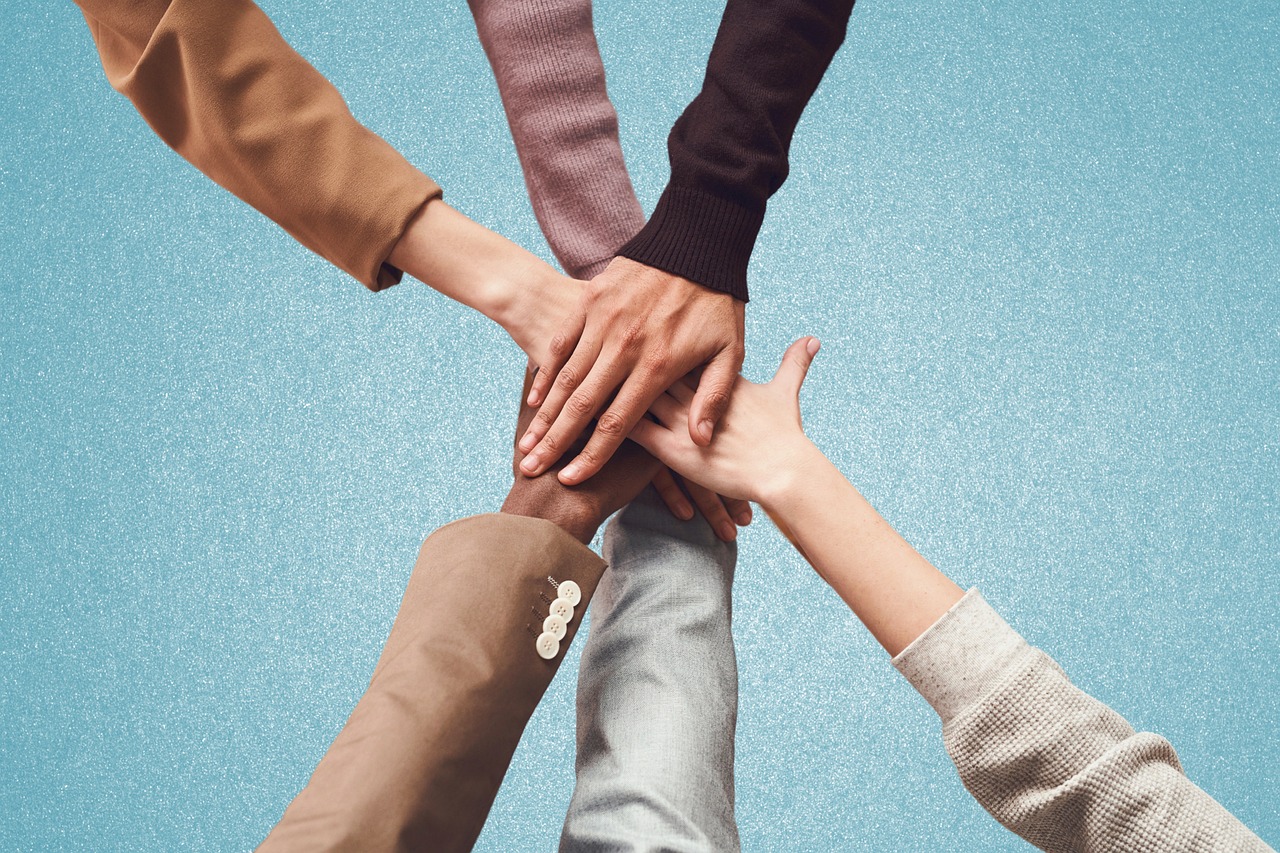
Real-Time Analytics and Insights
In today's fast-paced work environment, real-time analytics have become a game-changer for teams striving to stay ahead of the curve. Imagine having the ability to access live data that reflects your project's progress, team performance, and overall productivity, all at your fingertips. This is where AI steps in, transforming the traditional approach to data analysis and decision-making.
With the integration of AI-driven analytics tools, teams can now harness the power of data to make informed decisions swiftly. These tools provide insights that were once buried under layers of reports and spreadsheets, allowing team members to react promptly to any changes in their projects. For instance, if a project's timeline is slipping, AI can analyze various factors, such as resource allocation and team workload, to provide actionable insights that help in course correction.
Moreover, real-time analytics empower teams to identify trends and patterns that may not be immediately obvious. By leveraging AI's predictive capabilities, teams can foresee potential roadblocks and adjust their strategies accordingly. This proactive approach not only enhances efficiency but also fosters a culture of continuous improvement.
To illustrate the impact of real-time analytics, consider the following table that highlights key benefits:
| Benefit | Description |
|---|---|
| Improved Decision-Making | Access to live data allows teams to make decisions based on current circumstances rather than outdated information. |
| Enhanced Collaboration | Real-time insights foster a collaborative environment where team members can share information and align their efforts effectively. |
| Increased Accountability | With clear metrics and analytics, team members are more accountable for their contributions and performance. |
| Faster Problem Resolution | AI tools can quickly identify issues, enabling teams to address them before they escalate. |
In addition to these benefits, AI-powered analytics tools often come equipped with visualization features that make it easier for teams to digest complex data. By presenting information in a user-friendly format, such as dashboards or graphs, team members can quickly grasp key metrics and trends. This visual representation not only aids in understanding but also facilitates discussions during team meetings.
Furthermore, the integration of real-time analytics into project management software means that teams can track their performance against predefined KPIs (Key Performance Indicators). By continuously monitoring these metrics, teams can celebrate their successes and identify areas for improvement, creating a feedback loop that drives performance.
In conclusion, real-time analytics and insights powered by AI are revolutionizing how teams operate. By providing immediate access to critical data, these tools not only enhance decision-making but also foster a culture of transparency and collaboration. As teams continue to embrace these technologies, the potential for innovation and success becomes limitless.
- What are real-time analytics? Real-time analytics refers to the ability to analyze data as it is created or received, allowing for immediate insights and actions.
- How can AI improve team decision-making? AI can process large amounts of data quickly, providing teams with insights that help them make informed decisions based on current information.
- What tools are available for real-time analytics? There are various AI-driven analytics tools available, such as Tableau, Microsoft Power BI, and Google Analytics, each offering unique features for teams.
- Can real-time analytics enhance collaboration? Yes, by providing a shared view of project metrics and progress, real-time analytics fosters better communication and teamwork.

Enhancing Collaboration Through AI
In today's fast-paced work environment, effective collaboration is more crucial than ever. The advent of artificial intelligence (AI) has ushered in a new era of teamwork, transforming how we interact and collaborate. Imagine a workspace where team members can share ideas, track progress, and solve problems in real-time, regardless of their physical location. This is not just a dream; it's a reality brought to life by AI-enhanced collaboration tools.
AI-powered platforms are designed to break down traditional barriers that often hinder communication within teams. For instance, tools like Slack and Trello integrate AI features that help streamline conversations, prioritize tasks, and even suggest optimal times for meetings based on team members' availability. By analyzing communication patterns, these tools can highlight important messages and ensure that critical information doesn't get lost in the shuffle.
Furthermore, AI facilitates collaboration through smart document sharing. With platforms like Google Workspace, teams can work on documents simultaneously, and AI can provide real-time suggestions for edits, enhancing the quality of the output. This not only boosts productivity but also fosters a sense of teamwork, as everyone can contribute their insights and expertise in real-time.
One of the standout features of AI in collaboration is its ability to provide contextual insights. For example, AI can analyze previous projects and communication threads to provide team members with relevant background information when they need it. This means that when a new team member joins a project, they can quickly get up to speed without sifting through endless emails or documents. AI essentially serves as a digital assistant, making collaboration smoother and more efficient.
Moreover, AI tools are enabling teams to engage in more productive brainstorming sessions. By utilizing AI-driven platforms like Miro or Stormboard, teams can visualize ideas and concepts, allowing for a more dynamic exchange of thoughts. These tools often incorporate features like mind mapping and sticky notes, which are enhanced by AI to suggest connections and themes based on the input provided by team members.
In terms of enhancing engagement, AI can also analyze team interactions and provide feedback on collaboration effectiveness. For instance, AI can track participation levels in meetings, highlight who is contributing the most, and even suggest ways to involve quieter team members. This kind of insight is invaluable for fostering a more inclusive and engaged team environment.
As teams continue to adopt AI technologies, the potential for enhanced collaboration will only grow. AI is not just a tool; it’s a catalyst for change, encouraging teams to think differently about how they work together. With AI driving collaboration, teams can focus on what truly matters: innovation, creativity, and achieving their goals together.
- How does AI improve team communication? AI tools analyze communication patterns, prioritize messages, and suggest optimal meeting times, making it easier for teams to stay connected.
- What are some popular AI collaboration tools? Some widely used AI collaboration tools include Slack, Trello, Google Workspace, Miro, and Stormboard.
- Can AI help with conflict resolution in teams? Yes, AI can identify potential conflicts and suggest resolutions based on historical data and team dynamics.
- Is AI collaboration only beneficial for remote teams? No, AI collaboration tools can enhance teamwork for both remote and in-office teams by streamlining communication and workflow.
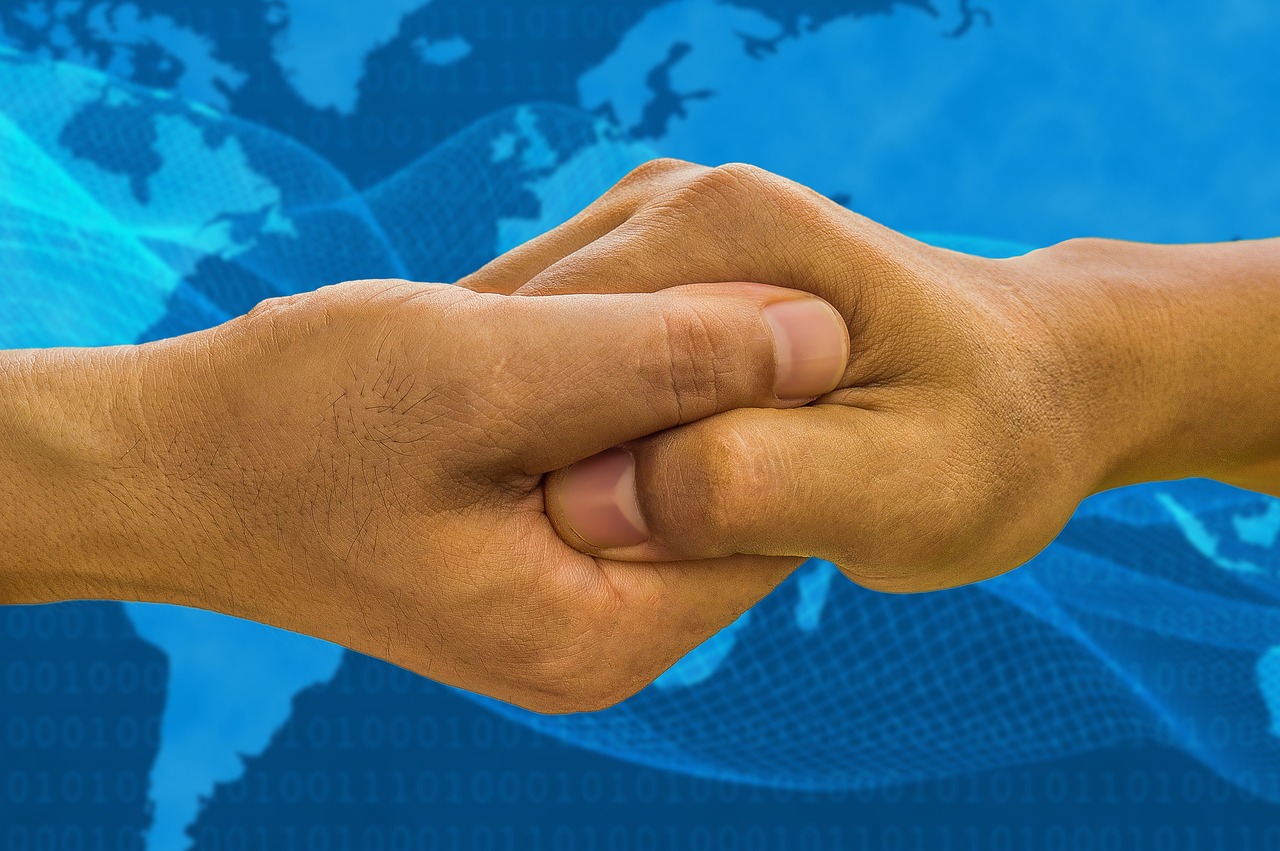
AI-Driven Decision Making
In today's fast-paced world, the ability to make quick and informed decisions is more critical than ever. Enter artificial intelligence (AI) – the game-changer that's revolutionizing how teams approach decision-making. AI's capacity to analyze vast datasets in mere seconds allows teams to navigate complex scenarios with confidence. Imagine having a super-smart assistant that sifts through mountains of information, highlighting the most relevant insights and trends. This is precisely what AI brings to the table, enabling teams to make decisions based on data rather than gut feelings.
One of the most significant advantages of AI in decision-making is its ability to provide real-time insights. Traditional methods of data analysis can often take hours or even days, leaving teams to make decisions based on outdated information. With AI, teams can access up-to-the-minute data, ensuring that their strategies are always aligned with the current landscape. This immediacy not only enhances the decision-making process but also fosters a culture of agility within teams, allowing them to pivot quickly when necessary.
Moreover, AI excels in identifying patterns and trends that might be invisible to the human eye. For instance, AI algorithms can analyze customer behavior, market dynamics, and even social media sentiments to predict future outcomes. This predictive capability empowers teams to strategize effectively, aligning their efforts with anticipated market shifts. It’s like having a crystal ball that provides clarity in uncertainty, enabling teams to plan with foresight.
Another fascinating aspect of AI-driven decision-making is its role in enhancing collaboration among team members. By providing a centralized platform where data insights are shared, AI tools foster a collaborative environment. Team members can easily access the same information, leading to more cohesive discussions and decisions. When everyone is on the same page, it minimizes misunderstandings and ensures that decisions are made collectively, leveraging the diverse perspectives within the team.
However, it's essential to recognize that AI is not a replacement for human judgment. While AI can provide valuable insights, the final decision should always consider human intuition and experience. The best outcomes arise when AI and human intelligence work in tandem. Teams that embrace this synergy can harness the strengths of both to drive innovation and achieve superior results.
To illustrate the impact of AI on decision-making, consider the following table that showcases various AI tools and their functionalities:
| AI Tool | Functionality | Benefits |
|---|---|---|
| IBM Watson | Data analysis and natural language processing | Offers deep insights from unstructured data |
| Google Analytics | Web traffic analysis | Helps teams understand user behavior and optimize strategies |
| Tableau | Data visualization | Transforms complex data into visual insights for better decision-making |
In conclusion, AI-driven decision-making is not just a trend; it's a necessity in the modern workplace. As teams continue to integrate AI technologies into their processes, they will find themselves better equipped to tackle challenges and seize opportunities. The future of teamwork is undoubtedly intertwined with AI, and those who embrace this evolution will lead the charge in innovation and success.
- How does AI improve decision-making? AI enhances decision-making by providing real-time data analysis, identifying trends, and offering predictive insights.
- Can AI replace human decision-making? No, AI should complement human judgment, not replace it. The best decisions come from a combination of AI insights and human intuition.
- What are some examples of AI tools for decision-making? Some popular AI tools include IBM Watson, Google Analytics, and Tableau, each serving different analytical purposes.
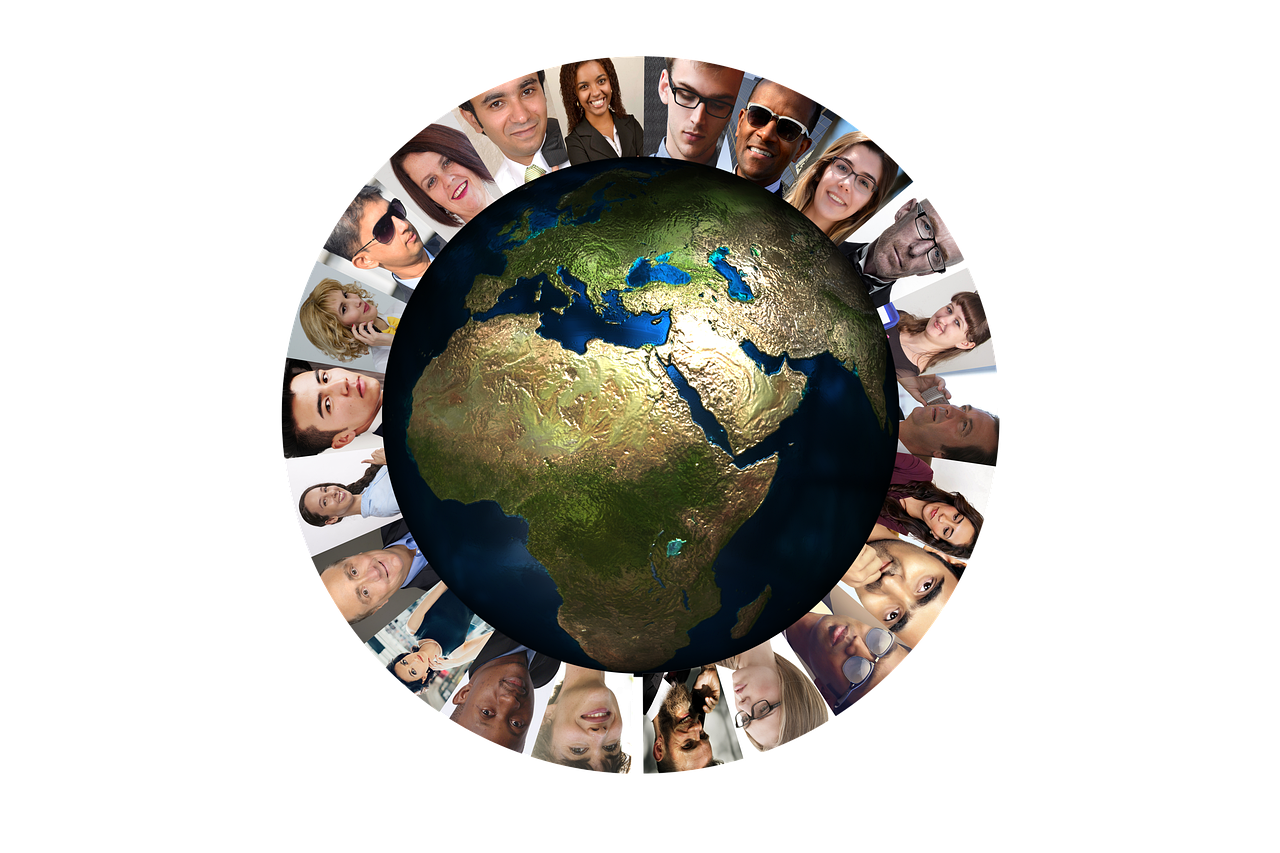
Predictive Analytics for Strategic Planning
In today's fast-paced business environment, predictive analytics has emerged as a game-changer for teams striving to enhance their strategic planning efforts. By leveraging vast amounts of data, predictive analytics allows teams to forecast future trends, identify potential challenges, and seize opportunities before they arise. Imagine being able to look into a crystal ball that not only shows you what might happen but also provides insights on how to navigate those scenarios effectively. This is the power of predictive analytics in action!
At its core, predictive analytics utilizes historical data and advanced algorithms to make informed predictions about future events. This capability is particularly valuable for teams, as it enables them to create data-driven strategies that align with anticipated market changes. For instance, a marketing team could use predictive analytics to determine which campaigns are likely to yield the highest return on investment, allowing them to allocate resources more effectively.
Moreover, predictive analytics can significantly enhance the decision-making process. By analyzing patterns in data, teams can uncover insights that might not be immediately apparent. For example, a sales team might discover that certain customer segments are more likely to respond positively to specific marketing tactics. This insight can lead to tailored strategies that resonate with those segments, ultimately driving sales and improving customer satisfaction.
To illustrate the impact of predictive analytics on strategic planning, consider the following table that outlines key benefits and applications of this technology:
| Benefit | Application |
|---|---|
| Improved Forecasting | Predicting sales trends based on historical data |
| Risk Management | Identifying potential risks and developing mitigation strategies |
| Resource Optimization | Allocating budgets and resources based on predicted outcomes |
| Enhanced Customer Insights | Understanding customer behavior and preferences for targeted marketing |
As teams begin to integrate predictive analytics into their strategic planning processes, they often experience a shift in how they approach challenges and opportunities. Instead of relying solely on gut feelings or past experiences, teams can now make decisions based on solid data. This not only increases confidence in their strategies but also fosters a culture of innovation and adaptability within the team.
In conclusion, predictive analytics is not just a buzzword; it’s a vital tool that empowers teams to navigate the complexities of modern business landscapes. By embracing this technology, teams can enhance their strategic planning efforts, leading to improved outcomes and a competitive edge in their respective industries. As we move forward, it’s clear that the integration of predictive analytics in teamwork will continue to evolve, opening new avenues for collaboration and success.
- What is predictive analytics?
Predictive analytics involves using historical data and statistical algorithms to identify the likelihood of future outcomes. - How can predictive analytics benefit my team?
It can improve forecasting, enhance decision-making, and optimize resource allocation. - Is predictive analytics only useful for large teams?
No, teams of any size can benefit from predictive analytics by making data-driven decisions. - What tools are available for predictive analytics?
There are various tools available, including Tableau, Microsoft Power BI, and specialized analytics software like SAS and IBM Watson.

Improving Conflict Resolution with AI
Conflict in teams is as inevitable as the sunrise. Whether it's a clash of ideas, personality differences, or miscommunication, these disputes can derail productivity and sour relationships. However, with the advent of artificial intelligence, teams now have a powerful ally in resolving conflicts swiftly and effectively. Imagine AI as a seasoned mediator, equipped with insights and tools to navigate the complexities of human interactions.
AI can analyze communication patterns and identify potential sources of conflict before they escalate. By utilizing natural language processing (NLP), AI systems can detect the tone and sentiment of conversations, flagging negative interactions that may require attention. For instance, if two team members consistently clash in emails or chats, AI can suggest a mediation session or provide insights into their communication styles, helping them understand each other better.
Moreover, AI-driven platforms can facilitate anonymous feedback mechanisms, allowing team members to voice concerns without fear of retribution. This transparency can foster an environment where issues are addressed proactively rather than reactively. For example, a simple AI tool could gather anonymous input on team dynamics and present the data to leadership, highlighting areas that need improvement. This approach not only resolves conflicts but also strengthens team cohesion.
Another fascinating aspect of AI in conflict resolution is its ability to propose solutions based on historical data. By analyzing past conflicts and their resolutions, AI can recommend tailored strategies for current disputes. This predictive capability ensures that teams are equipped with effective conflict resolution tactics drawn from previous experiences. Imagine having a digital advisor that learns from every interaction, continuously refining its approach to foster a harmonious work environment.
Furthermore, AI tools can streamline the process of conflict resolution by automating scheduling for mediation sessions and providing structured frameworks for discussions. For instance, an AI-powered platform could suggest optimal times for team members to meet, ensuring that everyone is available and prepared. This organized approach minimizes disruptions and helps maintain focus on resolving the issues at hand.
In summary, the integration of AI in conflict resolution not only enhances the efficiency of addressing disputes but also promotes a culture of understanding and collaboration. As teams continue to embrace these technologies, the future looks promising for smoother interactions and stronger relationships. By leveraging AI's analytical capabilities and data-driven insights, organizations can transform potential conflicts into opportunities for growth and innovation.
- How does AI identify potential conflicts?
AI uses natural language processing to analyze communication patterns and detect negative sentiments that may indicate brewing conflicts. - Can AI completely replace human mediators?
While AI can assist in conflict resolution, human empathy and understanding are irreplaceable. AI serves as a tool to enhance the mediation process. - What types of AI tools are available for conflict resolution?
There are various AI platforms that offer features such as sentiment analysis, anonymous feedback collection, and scheduling assistance for mediation sessions. - How can teams implement AI for conflict resolution?
Teams can start by integrating AI tools into their communication platforms and encouraging open feedback to identify areas for improvement.

The Future of AI in Team Dynamics
As we look ahead, the integration of artificial intelligence into team dynamics is not just a fleeting trend; it’s a transformative shift that promises to redefine how we collaborate and innovate. Imagine a workplace where AI acts as a co-pilot, guiding teams through the complexities of project management, communication, and decision-making. The possibilities are not just exciting; they are revolutionary!
In the not-so-distant future, we can expect AI to take on an even more prominent role in enhancing teamwork. For instance, AI systems will likely become adept at understanding team members' individual strengths and weaknesses, allowing for personalized task assignments. This means that instead of a one-size-fits-all approach, tasks will be allocated based on each member’s unique skills, increasing overall efficiency. Think of it as having a personal trainer for your work projects!
Moreover, as AI technology advances, we will see a surge in emotionally intelligent AI systems capable of recognizing and responding to team dynamics. These systems could analyze communication patterns and identify when a team is experiencing tension or conflict. By providing insights and suggestions for mediation, AI could help maintain a harmonious work environment, much like a skilled coach who knows when to step in and offer guidance.
Additionally, the future of AI in team dynamics will likely see the emergence of virtual collaboration spaces. These spaces will be powered by AI, enabling teams to work together in real-time, regardless of their physical locations. Imagine a virtual meeting room where AI curates discussions, highlights key points, and even suggests next steps based on the conversation flow. This will not only save time but also enhance engagement by ensuring that every voice is heard.
As we delve deeper into this future, it’s essential to consider the ethical implications of AI in teamwork. Will AI be used responsibly to enhance collaboration, or could it lead to over-dependence? Striking a balance will be crucial. Companies will need to establish guidelines and frameworks to ensure that AI serves as a tool for empowerment rather than a crutch that diminishes human creativity and intuition.
In conclusion, the future of AI in team dynamics holds immense potential. By enhancing communication, personalizing task management, and fostering emotional intelligence, AI can transform how teams operate. However, as we embrace these advancements, we must also remain vigilant about the ethical considerations they bring. The journey ahead is filled with opportunities for innovation and growth, and it's up to us to navigate it wisely.
- How will AI improve team communication? AI tools can enhance communication by streamlining interactions, providing real-time translations, and suggesting optimal communication methods based on team preferences.
- What are some examples of AI tools for team productivity? Tools like Asana, Trello, and Slack are increasingly integrating AI features that automate repetitive tasks and enhance collaborative efforts.
- Can AI help in conflict resolution among team members? Yes, AI can analyze communication patterns to identify potential conflicts and suggest resolutions, helping teams maintain a positive working environment.
- What is the role of predictive analytics in team planning? Predictive analytics can forecast trends and outcomes, allowing teams to strategize effectively and make informed decisions based on data-driven insights.
Frequently Asked Questions
- How does AI enhance communication within teams?
AI enhances communication by providing tools that facilitate real-time interactions, breaking down language barriers, and ensuring that team members can collaborate seamlessly. Platforms powered by AI can analyze communication patterns and suggest improvements, making it easier for teams to stay connected and engaged.
- What are some AI-powered tools that boost productivity?
There are numerous AI-powered tools designed to streamline workflows and automate repetitive tasks. Examples include project management software like Trello and Asana, which utilize AI to optimize task assignments and deadlines, allowing team members to focus on more strategic initiatives.
- Can AI help with task automation and delegation?
Absolutely! AI can automate routine tasks such as scheduling meetings, sending reminders, and managing emails. This not only saves time but also helps in delegating tasks more effectively by analyzing team members' workloads and suggesting optimal assignments.
- How does AI contribute to project management?
AI contributes to project management by providing insights into resource allocation, predicting project timelines, and identifying potential bottlenecks. Tools like Monday.com and ClickUp incorporate AI features that help teams manage projects more efficiently and adapt to changes quickly.
- What role does real-time analytics play in team performance?
Real-time analytics allows teams to access up-to-date data regarding their projects, enabling informed decision-making and quick adjustments. By leveraging AI-driven analytics tools, teams can track progress, measure outcomes, and refine strategies based on actual performance metrics.
- How can AI improve collaboration among team members?
AI improves collaboration by offering platforms that enhance engagement, such as virtual brainstorming tools and collaborative document editing. These AI-driven solutions foster a more inclusive environment where every team member can contribute ideas and feedback effortlessly.
- In what ways does AI assist in decision-making?
AI assists in decision-making by analyzing large datasets to identify trends and provide actionable insights. This capability allows teams to make quicker, more informed decisions, reducing the risk of errors and enhancing overall team effectiveness.
- What benefits do predictive analytics offer for strategic planning?
Predictive analytics offers significant benefits for strategic planning by forecasting potential outcomes and trends. This foresight enables teams to develop proactive strategies, allocate resources efficiently, and adjust plans based on anticipated changes in the market or project landscape.
- Can AI help resolve conflicts within teams?
Yes, AI can help identify potential conflicts by analyzing communication patterns and team dynamics. Some AI tools can even suggest mediation strategies or facilitate discussions, helping to foster a harmonious work environment and improve team morale.
- What does the future hold for AI in team dynamics?
The future of AI in team dynamics looks promising, with advancements expected to further enhance collaboration, productivity, and decision-making. As AI technology evolves, we can anticipate even more sophisticated tools that will redefine how teams work together and innovate.

